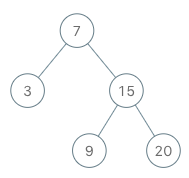| ID | Title | Difficulty | |
|---|---|---|---|
| Loading... | |||
173. Binary Search Tree Iterator
Medium
LeetCode
Stack, Tree, Design, Binary Search Tree, Binary Tree, Iterator
Problem
-
Implement the
BSTIteratorclass that represents an iterator over the in-order traversal of a binary search tree (BST):BSTIterator(TreeNode root)Initializes an object of theBSTIteratorclass. Therootof the BST is given as part of the constructor. The pointer should be initialized to a non-existent number smaller than any element in the BST.boolean hasNext()Returnstrueif there exists a number in the traversal to the right of the pointer, otherwise returnsfalse.int next()Moves the pointer to the right, then returns the number at the pointer.
Notice that by initializing the pointer to a non-existent smallest number, the first call to
next()will return the smallest element in the BST.You may assume that
next()calls will always be valid. That is, there will be at least a next number in the in-order traversal whennext()is called.Example 1:

Input ["BSTIterator", "next", "next", "hasNext", "next", "hasNext", "next", "hasNext", "next", "hasNext"] [[[7, 3, 15, null, null, 9, 20]], [], [], [], [], [], [], [], [], []] Output [null, 3, 7, true, 9, true, 15, true, 20, false] Explanation BSTIterator bSTIterator = new BSTIterator([7, 3, 15, null, null, 9, 20]); bSTIterator.next(); // return 3 bSTIterator.next(); // return 7 bSTIterator.hasNext(); // return True bSTIterator.next(); // return 9 bSTIterator.hasNext(); // return True bSTIterator.next(); // return 15 bSTIterator.hasNext(); // return True bSTIterator.next(); // return 20 bSTIterator.hasNext(); // return FalseConstraints:
- The number of nodes in the tree is in the range
[1, 105]. 0 <= Node.val <= 106- At most
105calls will be made tohasNext, andnext.
Follow up:
- Could you implement
next()andhasNext()to run in averageO(1)time and useO(h)memory, wherehis the height of the tree?
Code
/**
* Definition for binary tree
* public class TreeNode {
* int val;
* TreeNode left;
* TreeNode right;
* TreeNode(int x) { val = x; }
* }
*/
public class BSTIterator {
private TreeNode cur;
private Stack<TreeNode> stack;
public BSTIterator(TreeNode root) {
cur = root;
stack = new Stack<>();
}
/** @return whether we have a next smallest number */
public boolean hasNext() {
if (!stack.isEmpty() || cur != null) {
return true;
} else {
return false;
}
}
/** @return the next smallest number */
public int next() {
while (cur != null) {
stack.push(cur);
cur = cur.left;
}
cur = stack.pop();
int val = cur.val;
cur = cur.right;
return val;
}
}
/**
* Your BSTIterator will be called like this:
* BSTIterator i = new BSTIterator(root);
* while (i.hasNext()) v[f()] = i.next();
*/
按 <- 键看上一题!
172. Factorial Trailing Zeroes
按 -> 键看下一题!
174. Dungeon Game


